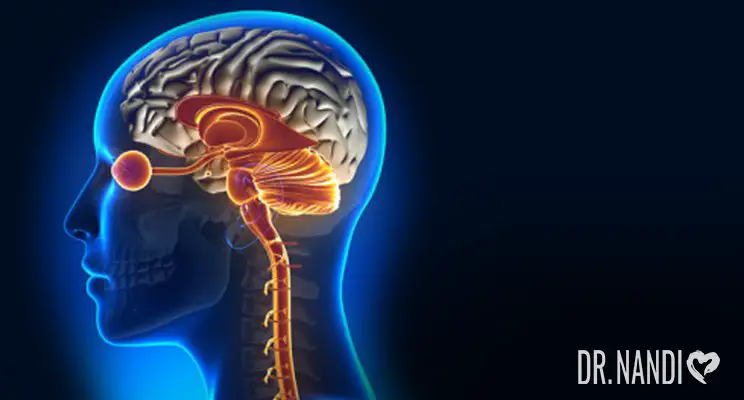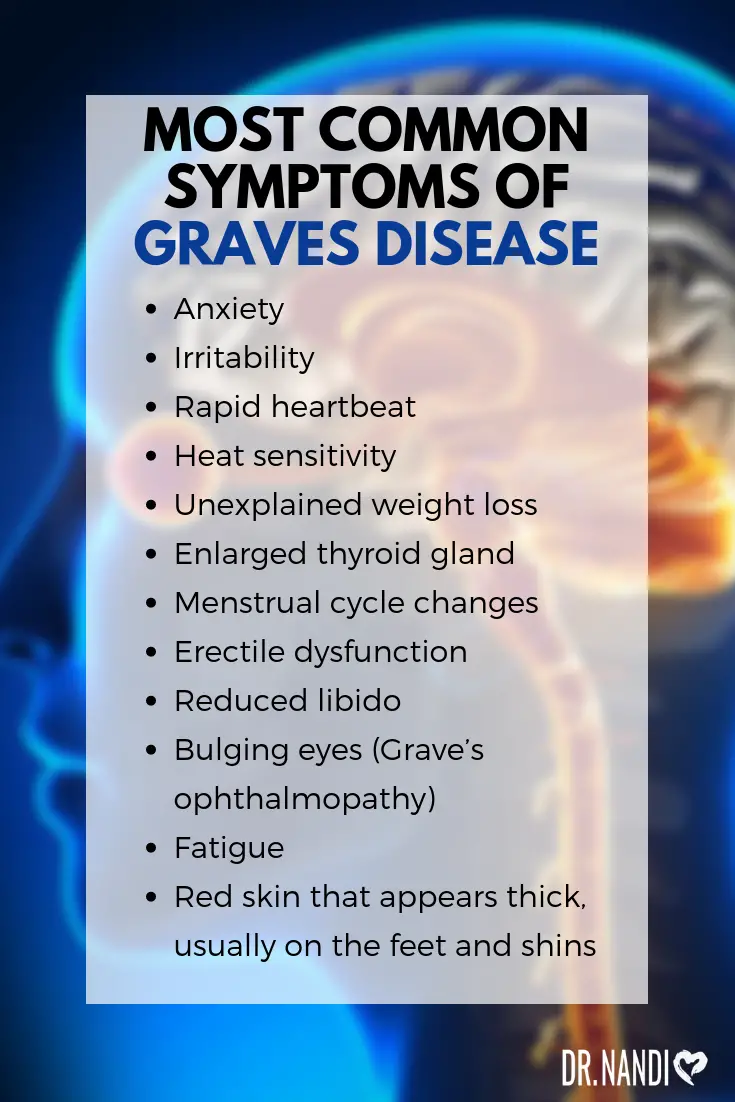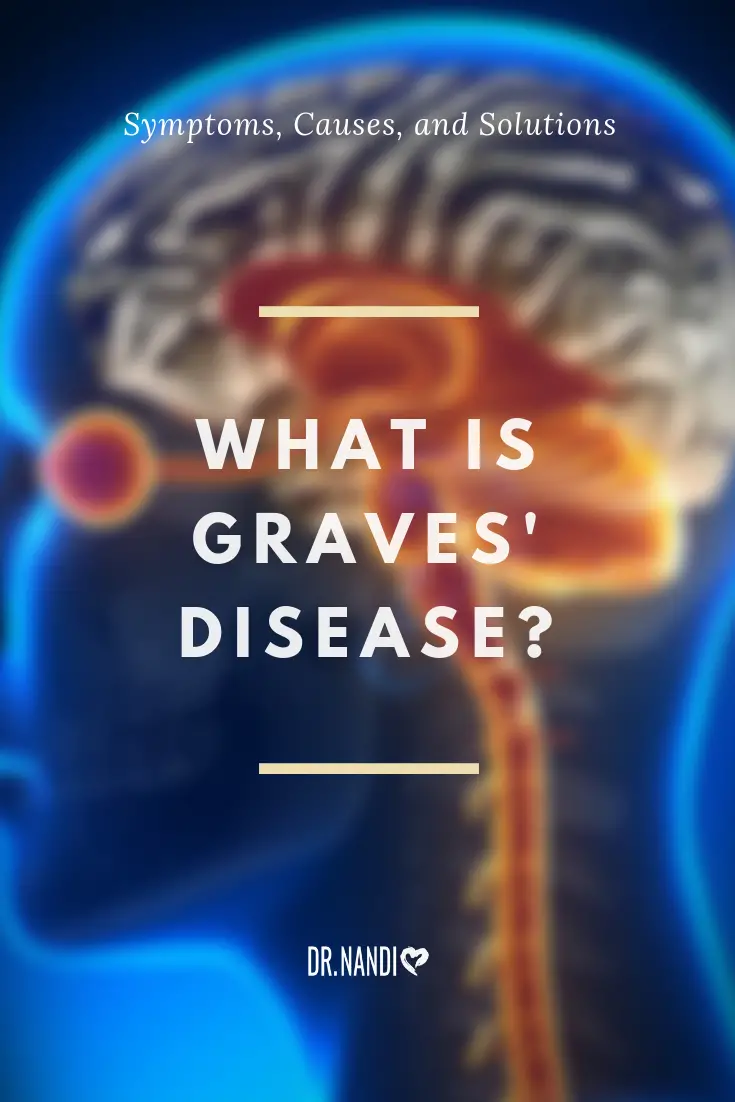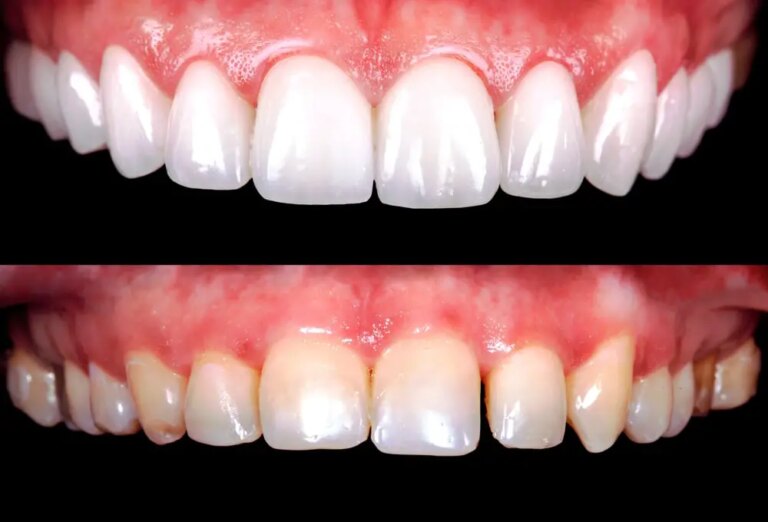Graves’ Disease is the most common form of hyperthyroidism in the United States. According to statistics, about one in 200 people have this disease, and it is most common among women under 40 years of age. I have many patients with Graves’ disease in my practice and am passionate about spreading awareness and understanding of this condition.
Thyroid disorders can be effectively treated in most cases. With medications and lifestyle changes, many patients are able to resolve their symptoms and achieve a good quality of life. Because autoimmune conditions cannot generally be cured completely, such as Graves’ Disease, you will need to make conscious decisions throughout the rest of your life in order to maintain good health.
No two cases of Graves’ Disease are exactly alike. Thus, working together with a trusted physician to determine the best course of action for you is always a good idea.
What Is Graves’ Disease?
Graves’ Disease is an autoimmune condition that affects the thyroid gland, causing it to be overactive (hyperthyroidism). To understand this disease it is important to understand the purpose and basic functions of the thyroid.
The thyroid is an endocrine gland that sits in the front of the neck, just below the Adam’s apple. It is responsible for secreting hormones that influence:
- Metabolism
- Heartbeat
- Development/Growth
- Brain maturation
- Sexual function
- Sleep
- Thought patterns
- Body temperature
In Graves’ Disease, the immune system creates an antibody called thyroid-stimulating immunoglobulin (TSI) which signals the thyroid to produce hormones abnormally. This results in an overactive thyroid that then creates symptoms and problems throughout the body.
Symptoms of Graves’ Disease
The symptoms of Graves’ Disease can all be traced back to an overproduction of thyroid hormones. Because thyroid hormones affect the heart, it makes sense that the overabundance of these hormones would cause heartbeat irregularities. Because they also influence metabolism, it makes sense that too much would cause unexplained weight loss. It is the same with all the symptoms of Graves’ Disease.
- Anxiety
- Irritability
- Rapid heartbeat
- Heat sensitivity
- Unexplained weight loss
- Enlarged thyroid gland
- Menstrual cycle changes
- Erectile dysfunction
- Reduced libido
- Bulging eyes (Grave’s ophthalmopathy)
- Fatigue
- Red skin that appears thick, usually on the feet and shins (Grave’s dermopathy)
 Graves’ Ophthalmopathy
Graves’ Ophthalmopathy
Between 25 and 50 percent of people diagnosed with Graves’ disease develop a condition called Graves’ ophthalmopathy. This is when inflammation creates an autoimmune response around the eyeballs. The symptoms look like this:
- Bulging eyes
- Pressure/pain in or around the eyes
- Puffy eyelids
- Inflammation around the eyes
- Vision problems (double vision, vision loss)
- Light sensitivity
It is most often seen in those who have or have had Graves’ disease or another form of hyperthyroidism.
Graves’ Dermopathy
A rare symptom of Graves’ Disease is called Graves’ dermopathy. It looks like reddening and thickening of the skin, usually on the shins or tops of feet.
Are Graves’ Disease And Hyperthyroidism The Same?
Graves’ Disease is a cause of hyperthyroidism, but not the only one. Hyperthyroidism may also be caused by a toxic nodular or multi-nodular goiter, which are abnormal lumps that grow on the thyroid, causing it to produce excess hormones. It may also happen in those who consume too much iodine. (2)
Occasionally women will develop hyperthyroidism during pregnancy or in the year after giving birth.
So, Graves’ disease is a form of hyperthyroidism but hyperthyroidism is not necessarily Graves’ Disease.
Complications of Graves’ Disease
- Heart disorders. Because Graves’ disease affects the heart, it can cause changes in the structure and function of heart muscles, leading to an inability to pump enough blood to the entire body and/or heart rhythm disorders.
- Thyroid storm. When Graves’ disease is left untreated it can lead to a rare but life-threatening condition called thyroid storm. It happens when an already overactive thyroid becomes accelerated, causing fever, profuse vomiting, irregular heartbeat, yellow skin and eyes, seizures, low blood pressure, and coma.
- Brittle Bones. If hyperthyroidism is not treated, it can eventually affect the skeletal system. Too much thyroid hormone interferes with the body’s ability to store calcium in the bones, leading to weaker/brittle bones.
- Pregnancy complications. If Graves’ Disease develops during pregnancy it may cause complications such as miscarriage, preterm birth, preeclampsia, fetal thyroid problems, poor fetal growth, and maternal heart failure.
What Causes Graves’ Disease?
Graves’ disease, as with other autoimmune conditions, is caused by a malfunction of the immune system. The exact cause of Graves’ Disease specifically is still unknown. There are certain factors that make one more at risk for Graves’ Disease which I will discuss below.
Understanding Autoimmunity
Your immune system is set up to defend your body against foreign substances, viruses, or bacteria. When the immune system suspects one of these has entered the body, it creates specific antibodies that will target the invader. This is a natural and healthy immune response.
Autoimmune disease occurs when your immune system mistakenly attacks and destroys healthy tissue inside your body. In Graves’ Disease, the immune system creates an antibody to part of the thyroid and causes the thyroid to produce more hormones than the body needs.
Am I At Risk of Graves’ Disease?
Here are some potential risk factors for Graves’ Disease.
Genetics and Graves’ Disease.
People who have a close relative, parent, or sibling with Graves’ Disease are more likely to develop it themselves than those who have no family history of the disease.
Age and Graves’ Disease.
Graves’ disease is most commonly diagnosed in people under 40 years of age.
Gender and Graves’ Disease.
Women are more at risk for Graves’ disease than men.
Other autoimmune conditions and Graves’ Disease.
If you have other autoimmune conditions, you are more likely to develop Graves’ disease than those who have no history of autoimmunity.
Stress and Graves’ Disease.
Physical or emotional stress from challenging life events or jobs may trigger the onset of Graves’ Disease in those who are genetically susceptible.
Pregnancy/Childbirth and Graves’ Disease.
As mentioned above, sometimes women will develop Graves’ disease during pregnancy or within a year of giving birth.
Smoking and Graves’ Disease.
Smoking weakens the immune system and may make one more at risk for developing autoimmune conditions such as Graves’ disease.
How Is Graves’ Disease Treated?
When choosing a protocol to tackle Graves’ Disease symptoms, always work with your doctor to help create the best plan for you and your unique situation. Following are some of the most common conventional and non-conventional treatments used to treat this condition.
Diagnosing Graves’ Disease
The first step is diagnosis. After evaluating your symptoms, there are a few tests your doctor may want to perform to confirm that what you are experiencing is due to Graves’ Disease and not another condition.
Physical Exam for Graves’ Disease
Your physician will do a general physical exam, paying special attention to your eyes, skin, and pulse. He will also gently feel your neck to see if the thyroid is enlarged.
Blood test for Graves’ Disease
Through testing a blood sample, your doctor will be able to tell if your levels of thyroid-stimulating hormone (TSH) are thyroid-produced hormones are normal or out of range. In patients with Graves’ Disease, TSH will be low and thyroid hormones will be high.
Sometimes your doctor will also test for the antibody known to cause Graves’ Disease, especially if he thinks your hyperthyroidism may have another cause.
Radioactive iodine uptake for Graves’ Disease
In this test, the doctor will use radioactive ions and a special scanning external camera to see how quickly your thyroid is absorbing iodine. This will help them know if Graves’ Disease is the cause of their symptoms or if there might be another condition at play.
Ultrasound for Graves’ Disease
An ultrasound will be able to show your physician if your thyroid is enlarged. It is also an alternative to radioactive iodine uptake testing for pregnant women.
Conventional Treatments For Graves’ Disease
Beta-Blockers for Graves’ Disease
Generally, physicians first begin treating their hyperthyroid patients with beta-blockers. These do not prevent the thyroid from producing hormones but block their effect on the body. They provide quick relief for symptoms such as irregular heartbeat, tremors, anxiety, mood swings, heat intolerance, and sweating.
Beta-blockers may cause problems with patients treating asthma or diabetes.
Radioactive Iodine Therapy for Graves’ Disease
In this therapy, the doctor will have you take radioactive iodine by mouth. Radioiodine works to destroy overactive cells in the thyroid and lessen symptoms over time. It may come with side effects, including temporary worsening of Graves’ ophthalmopathy and tenderness in the neck. It is not used in women who are pregnant or breastfeeding.
Anti-thyroid Medications for Graves’ Disease
Anti-thyroid medications work to decrease hormone production by interfering with the thyroid’s ability to use iodine. They come with heavier side effects than other treatments, including joint pain, liver failure, weakening of immune system function, rash, and birth defects in unborn children.
Surgery (Thyroidectomy) for Graves’ Disease
In severe cases, surgery may be necessary to remove all or part of the thyroid. If this happens you will need long-term hormone therapy to provide your body with the vital hormones your thyroid use to provide.
Lifestyle Treatments For Graves’ Disease
There are some actions you can take on your own to improve your symptoms, reduce the negative effect of your symptoms on your body and generally feel better overall. Here are some of my recommendations:
Dietary Recommendations for Graves’ Disease
Get tested for food allergies, and eliminate any to which you are sensitive. Common offenders include dairy, wheat, soy, corn, preservatives, and chemical additives.
Graves’ Disease Diet
Eat More Of These:
- Fresh fruits and vegetables, especially antioxidant-rich varieties
- Eat foods high in B vitamins like sea vegetables and regular veggies
- Healthy oils such as coconut oil, olive oil, avocado oil, etc
- Lean meats
- Cold-water fish
- Beans
- Herbs like turmeric, lemon balm, and green tea (caffeine-free)
Eat Less Of These:
- Soy (may interfere with thyroid hormone medications)
- Iron supplements
- Refined grains (bread, pasta)
- Sugar
- Red meats
- Processed meats
- Trans fat (fast, fried foods)
- Alcohol
- Tobacco
Exercising for Graves’ Disease
Exercise can benefit you in a variety of ways. Incorporating more movement into your daily routine will improve your mood and help you feel better in general. It will also help with possible weight gain that can come from slowing down your hyperactive thyroid. Weight training can help with maintaining bone density, which will help you avoid brittle bones.
Reducing Stress for Graves’ Disease
Stress has been shown to trigger or worsen Graves’ Disease. If you feel chronically stressed or consistently overwhelmed, it may be time to slow down. Say no to some things in your life and prioritize what is most important. Make your own well-being a top priority and make time in every day to relax and focus on taking care of yourself. Some good ways to do this are:
- Warm bath
- Walking
- Massage
- Better quality sleep/regular sleep routine
- Using adaptogenic herbs like ashwagandha and turmeric
- Acupuncture
Treating Graves’ Ophthalmopathy
Graves’ ophthalmology can be a troubling complication of Grave’s Disease, and your doctor will most likely address it separately with specific treatments. Here are the most common methods:
Corticosteroids for Graves’ Disease.
These can help to reduce the inflammation and swelling behind your eyes. Side effects can include fluid retention, weight gain, blood sugar imbalance, increased blood pressure, and mood swings.
Prisms for Graves’ Disease.
These go in your glasses to correct double vision that may occur from Graves’ Disease.
Orbital decompression surgery for Graves’ Disease.
If bulging is not improved through other treatments, your doctor may recommend surgery to remove the bone between your eye socket and sinuses. This will allow room for your eyeball to move back into place.
Orbital radiotherapy for Graves’ Disease.
In this older and less common treatment, a professional will use targeted X-rays to destroy some soft tissue behind your eyes. The idea is to give more room for your eyeballs to move back into place, but the benefits are not well documented.
Cool Compress for Graves’ Disease.
Laying a cool compress over your eyes may help soothe pain and inflammation.
Sunglasses for Graves’ Disease.
Avoid irritation and sensitivity to sunlight by wearing sunglasses when outside.
Lubricating eyedrops for Graves’ Disease.
Bulging may increase dryness in the eyes. Using lubricating eyedrops will help to reduce dryness and scratchiness.
Stop smoking for Graves’ Disease.
Smoking can make symptoms of Grave’s ophthalmopathy worse.
Heading to the Doctor? Here is a Doctor’s Checklist for Graves’ Disease.
Other Frequently Asked Questions About Graves’ Disease
Q. Can Graves’ Disease kill you?
A. Depending on the severity of Grave’s Disease, it can become a life-threatening condition if not treated properly. You should always work with a medical professional and make your health a top priority.
Q. Can Graves’ Disease cause cancer?
A. Papillary thyroid cancer is a concern in patients with Grave’s Disease, and the risk may be as high as 42%. (1)
Q. Will Graves’ Disease ever go away?
A. Grave’s disease can go into remission when treated with anti-thyroid medications. However, there is still a chance the body will create the thyroid-stimulating antibodies again, causing it can come back.
Q. Why is it called Graves’ Disease?
A. Grave’s disease is named after the doctor who first described it, Robert K. Graves. He diagnosed the first patient with it in 1835. In Europe it is also referred to as Basedow’s disease; Adolph Basedow was another physician who described the same disease in 1840.
Q. When is Graves’ Disease awareness?
A. January is Thyroid Disease Awareness Month and includes awareness for Grave’s Disease.
Q. What are Graves’ Disease antibodies?
A. In Grave’s Disease, the immune system creates an antibody called thyroid-stimulating immunoglobulin (TSI) which signals the thyroid to produce hormones abnormally. This results in an overactive thyroid that then creates symptoms and problems throughout the body.
Q. How does Graves’ Disease affect pregnancy?
A. In some women, when Grave’s disease is treated properly, the pregnancy may continue with no complications. However, in some women problems such as miscarriage, preterm birth, preeclampsia, fetal thyroid problems, poor fetal growth, and maternal heart failure may occur.
Q. How does Graves’ Disease go into remission?
A. With proper treatment, the antibody responsible for Grave’s disease symptoms may go away entirely either short-term or long-term. This is usually due to anti-thyroid drugs such as methimazole or propylthiouracil.
Q. Will a thyroidectomy cure Graves’ Disease?
A. Removing the thyroid completely means that Grave’s disease antibody can no longer affect the thyroid. This may be considered a cure by some. However, once the thyroid is removed, one must do hormone therapy indefinitely to restore important hormones the thyroid used to create.
Q. Can Graves’ Disease cause dizziness?
A. Thyroid abnormalities such as are caused by Grave’s disease may cause dizziness and instability. They also cause the body to overheat more easily, which is what seemed to have happened in the incident with Wendy Williams.
Q. Can Graves’ Disease cause infertility?
A. The thyroid creates vital hormones for the reproductive system. When the thyroid is affected negatively and hormone levels are out of balance, this may indeed cause problems with infertility in both women and men. (4,5)
 Final Thoughts on Graves’ Disease
Final Thoughts on Graves’ Disease
If you think you might have Graves’ Disease, I suggest scheduling an appointment with your healthcare professional to get proper testing. There is a lot you can do to keep your body well and reduce the impact of this disease. Here is a Doctor’s Checklist for Graves’ Disease.
I believe strongly that we all should be our own #HealthHero. This means that you are committed to your own well-being and will do what it takes to live a life of health and vitality. When you feel your best, you can make the most impact in the lives of those you love and in the community.
Did you find the information in the post useful? What other conditions would you be interested in learning about on our blog? Comment below.
References
- https://www.thyroid.org/patient-thyroid-information/ct-for-patients/vol-7-issue-7/vol-7-issue-7-p-8-9/
- https://ghr.nlm.nih.gov/condition/graves-disease#genes
- https://www.thyroid.org/graves-disease/
- https://www.ncbi.nlm.nih.gov/pmc/articles/PMC3942334/
- https://www.ncbi.nlm.nih.gov/pmc/articles/PMC3136077/




 Graves’ Ophthalmopathy
Graves’ Ophthalmopathy Final Thoughts on Graves’ Disease
Final Thoughts on Graves’ Disease















